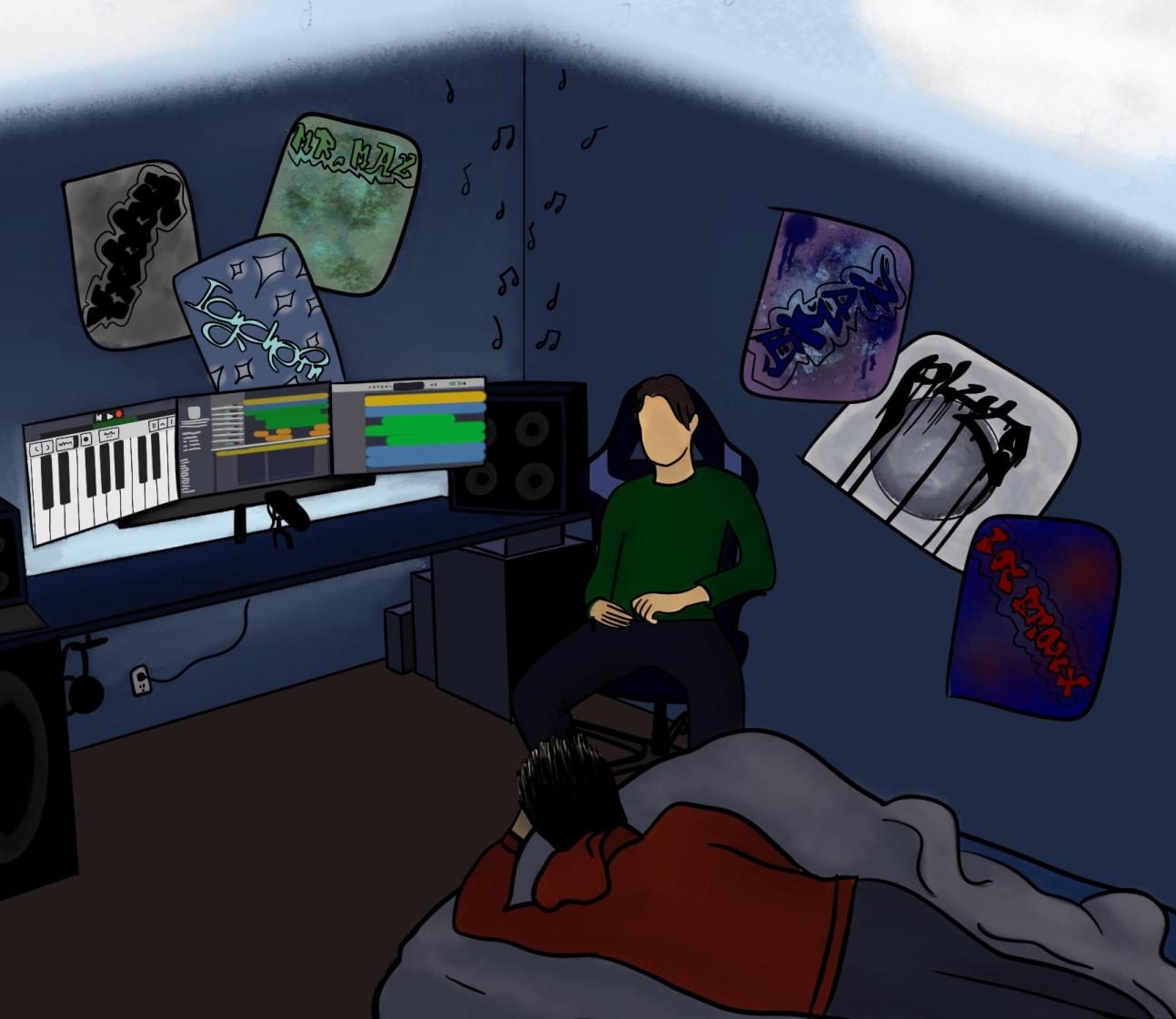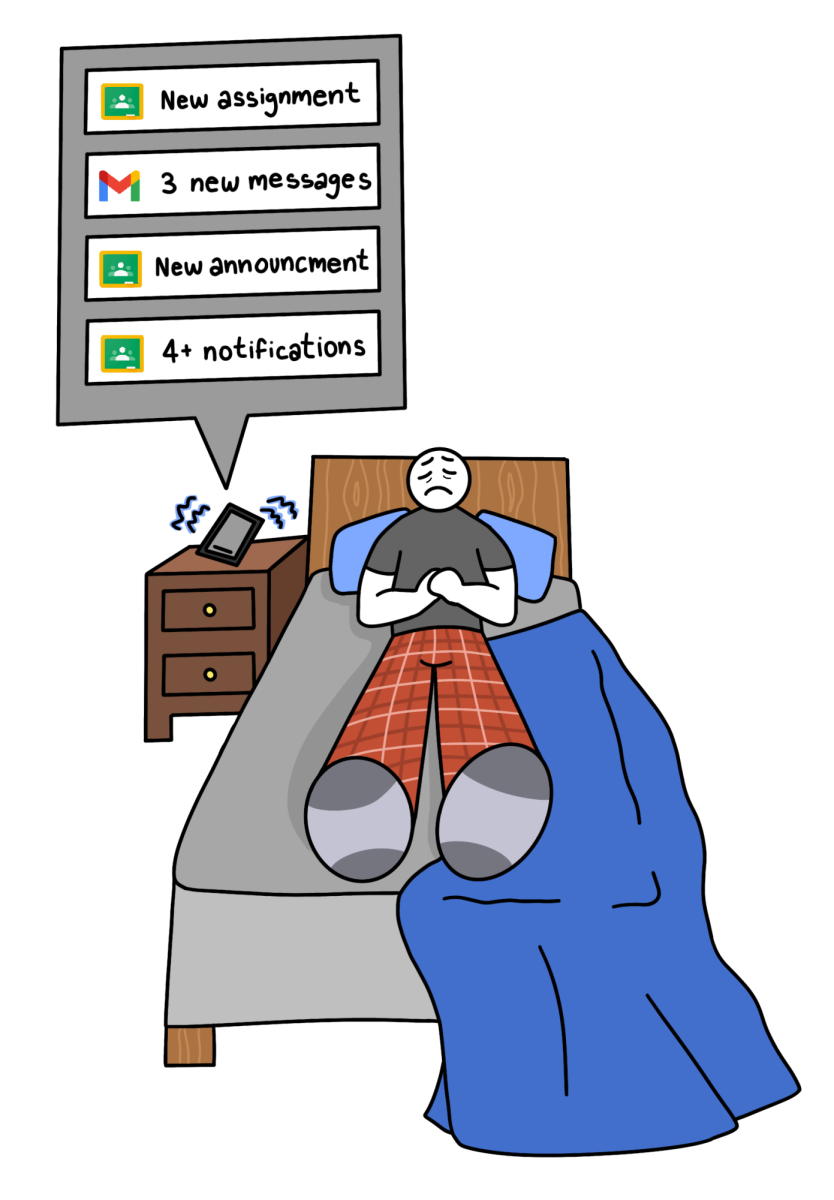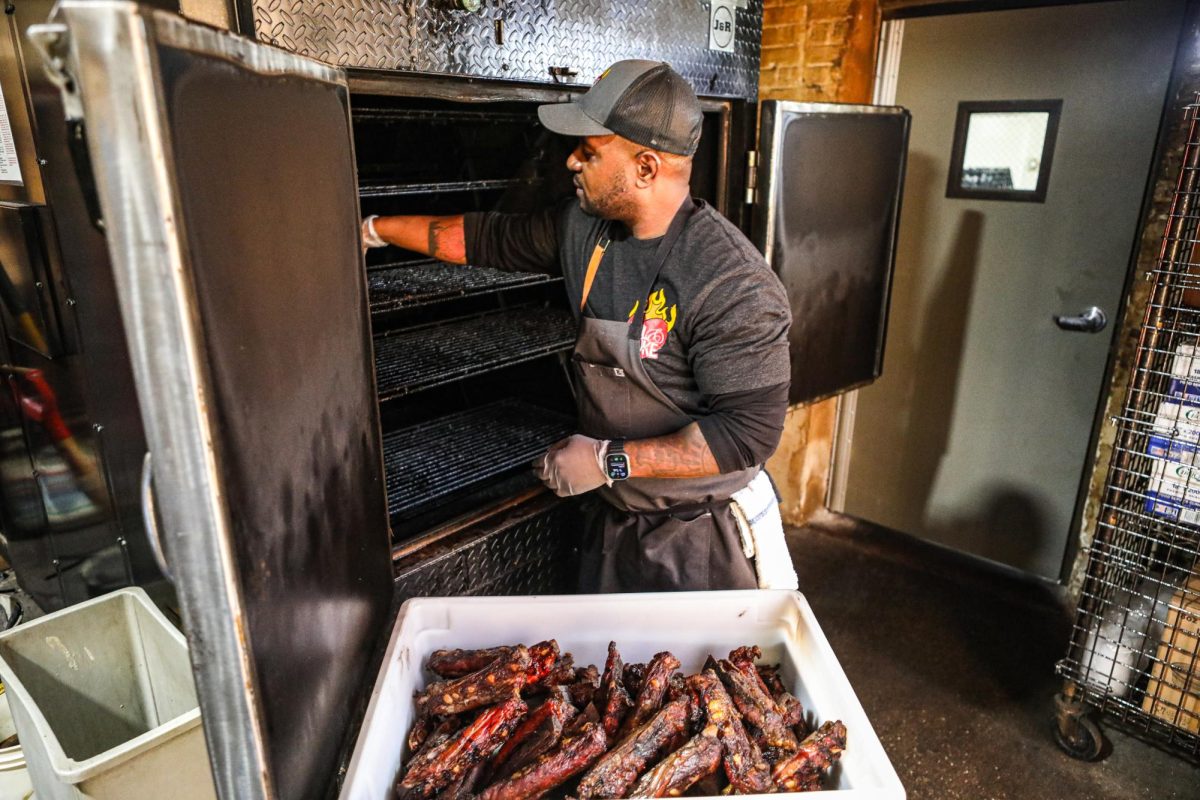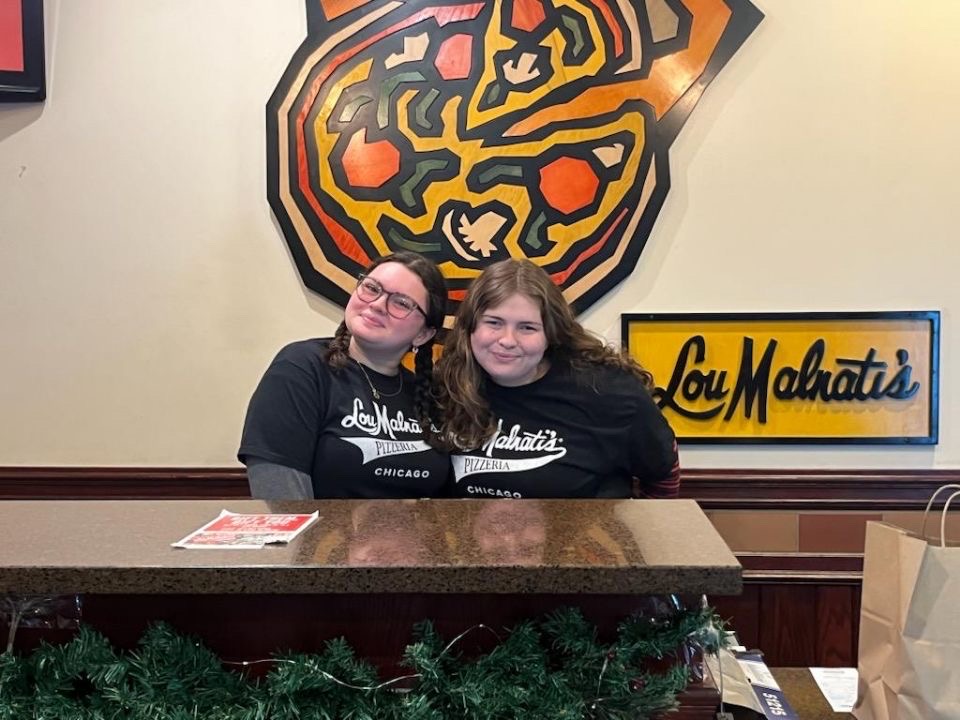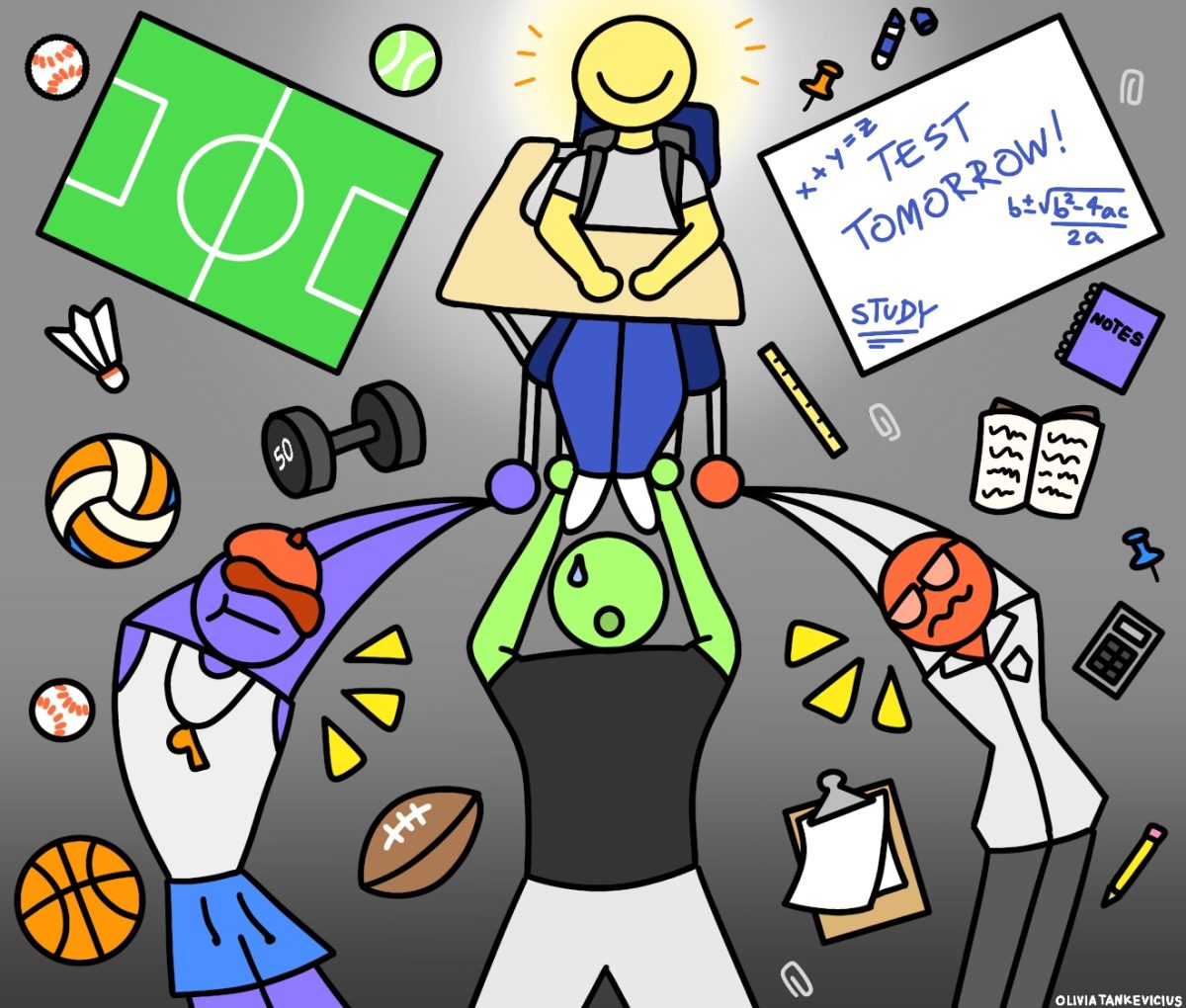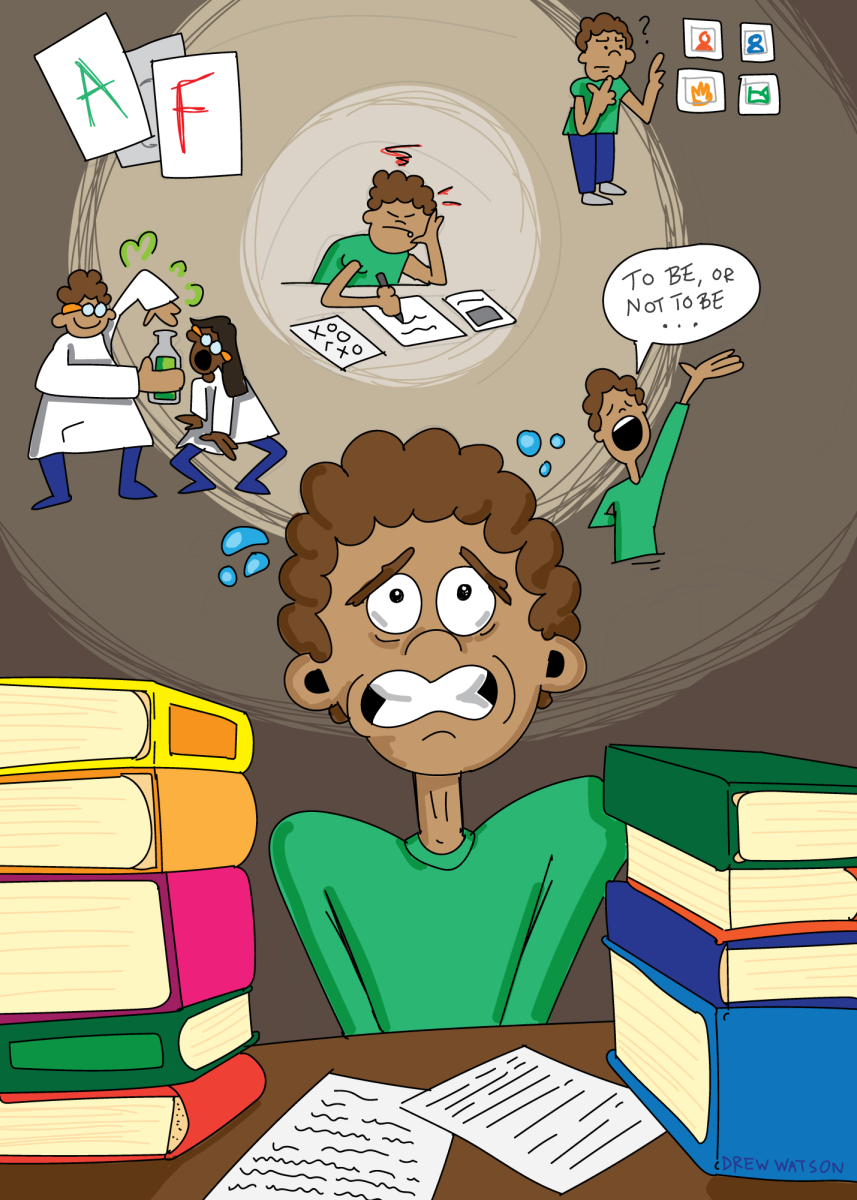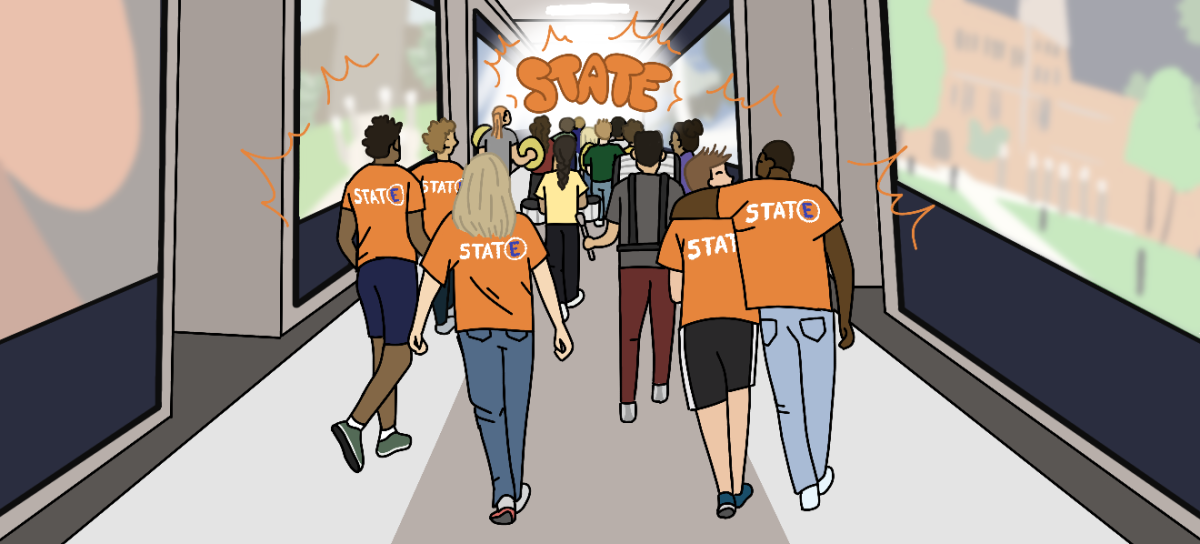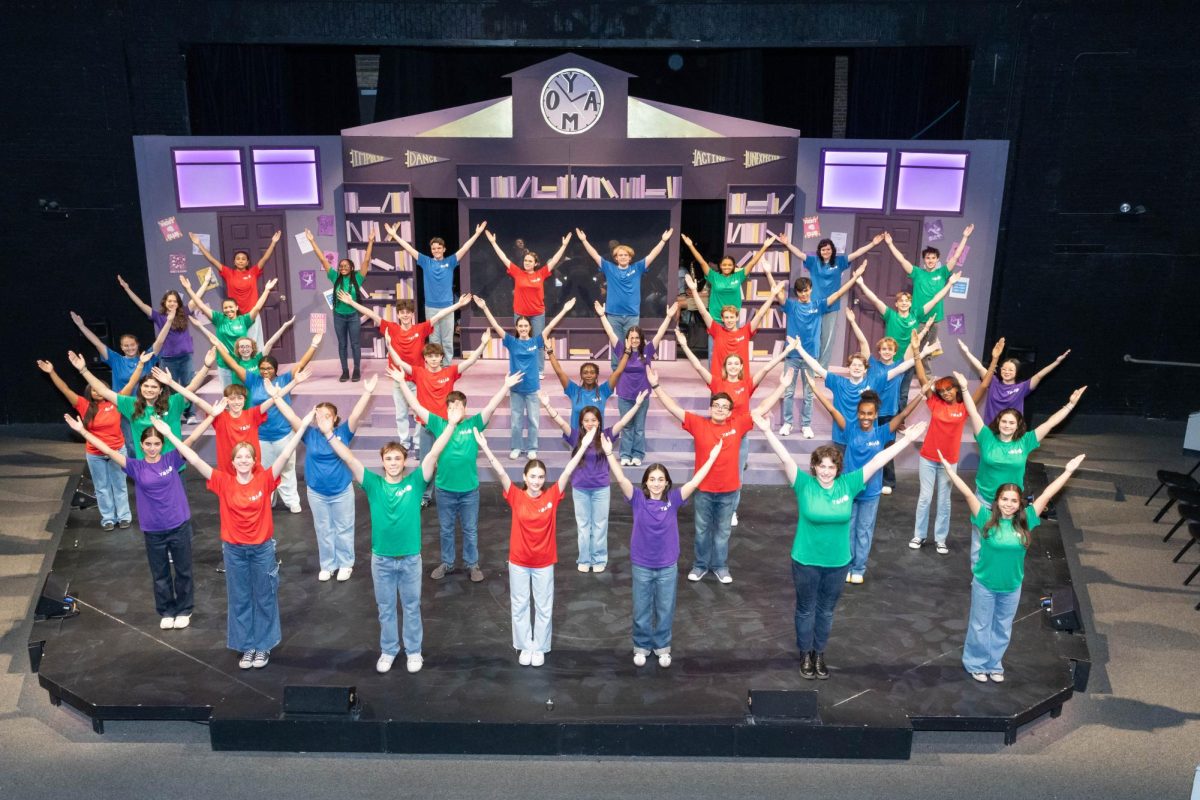Situated in the depths of the arts wing on the first floor of ETHS lies a collection of recording spaces with a shared purpose: to offer the student body an opportunity to produce their own music. In the spring of his sophomore year, senior Roshan Mueller found himself in one of these rooms, surrounded by a group of students, rapping alongside two other aspiring artists—seniors Davine Powell and Izayah Carr—whom he had met the day before.
A La La Land drill beat that Mueller had created with senior Joaquin Diversiev rang through the speakers as Carr sang, Powell “dropped heinous ad libs” and Mueller supplemented the track with rapping of his own. With both hands on his headphones, this collective effort would not only lead to the debut of Mueller’s very first song, Big Ben, but also serve as a catalyst for the making of Doc Bronx: Mueller’s chosen stage name that can be traced back to his childhood in Brooklyn, NY.
“[It was] f*****g beautiful,” Mueller says. “[Before that day], I had [only] dabbled in a little SoundCloud rapping as a joke in middle school back in Brooklyn.”
A lack of open spots in Spanish landed Mueller in German class, where his early interest in SoundCloud rapping resurfaced.
“I was in German class, and I didn’t have enough adjectives to describe [myself for an icebreaker], so I was like, ‘SoundCloud rapper.’ After class, Joaquin approached me and was like, ‘Yo, let me produce a song for you.’ And I was like, ‘Dude, I don’t rap.’ He’s like, ‘Let me do it.’ [So] he produced a song for me, and it’s history,” Mueller says.
From that moment on, the pair has leveraged their individual talents to produce tracks that attract nearly 150 monthly listeners on Spotify.
“I’ll go over to Joaquin’s house, and I’ll be like, ‘Yo, we need to sample this [track I had found],’ and I’ll lie down on his bed. He’ll play me different sounds, and I’ll be like, ‘I’ll take that,’ and then he’ll just make the beat around what I pick. The [beats are] always gas because Joaquin will speed up the sample or chop it up. It’s like, you give the top chef a raw piece of meat and you’re like, ‘What can you do with this?’ I give him a raw sample, and he turns it into a five-star meal,” Mueller says.
This process of collaboration is a frequent occurrence for both Mueller and Diversiev. All 30 of Mueller’s songs have gone from concept to completion in Diversiev’s room, starting with a generation of ideas that transforms into a streamable track by the night’s end.
“I’ll be with [an] artist like Doc Bronx, and they’ll just be tellng me ‘Do this, do that,’ and then I’ll try to do whatever they’re saying in the Digital Audience Workspace (DAW),” Diversiev says. “And then if they don’t like it, I’ll change it; it’s a back and forth process of collaboration.”
Mueller and Diversiev are just two of the 130 million people that use SoundCloud to release or stream music each day. Founded in 2007 by Alexander Ljung and Eric Wahlforss, the streaming service has seen the rise of artists such as XXXTentacion, Juice Wrld and Playboi Carti, distinguishing itself as a platform for rappers to jump-start their career.
For Powell, who uses the stage name PLUTOXO, the cafeteria at Chute Middle School—a small beginning—served as a stepping stone to great success in the SoundCloud world.
“When I was in middle school, my friends [and I] would just get in a circle during lunch and start freestyling. We [were] not expecting to be the next Drake, [but] during that time, I developed my freestyling skills and learned how to write and make music,” Powell says. “And when I first started making music, it was just [me], my Macbook and my gaming headset; that’s it.”
Powell has now released over 30 songs on SoundCloud, and while most artists write their lyrics ahead of time, Powell still freestyles virtually all of his tracks.
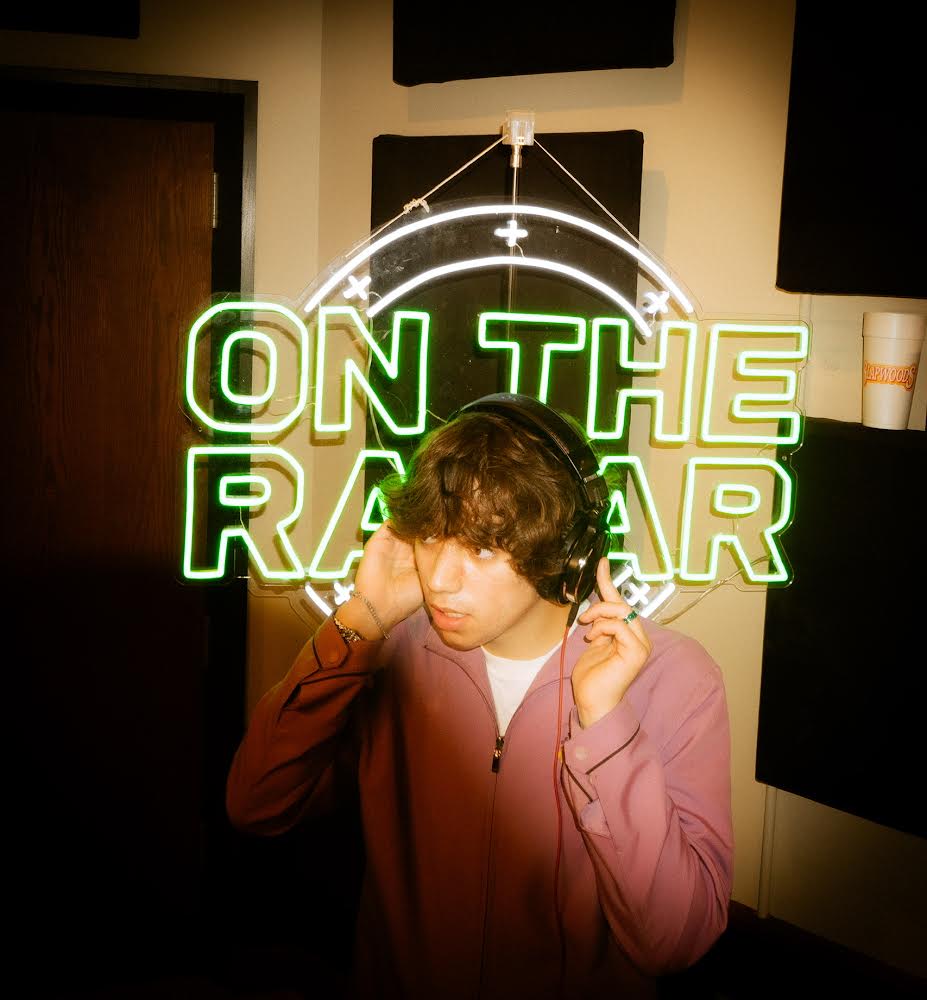
“My process of [producing] is different from other rappers. When I go into the studio, I [often] don’t have a plan. Sometimes, I leave the studio with [around] 50 songs, and it’s all freestyle,” Powell shares. “I don’t like writing music; I just go off the top of my head.”
Because of the spontaneity of this approach to music production, Powell’s music doesn’t have one set style. Rather, each song is a representation of his mindset in that particular moment.
“[The music I make] depends on how I’m feeling that day. If I’m feeling really chill, I won’t try to go out of my comfort zone [to be] overly hype. I always stick to how [I] feel, because that’s how you can make your best art,” Powell says.
Other artists dedicate varying amounts of time to bring just one song to fruition. Senior Jackson Burton, who goes by the stage name Yxbby, records all of his music in his basement—a process that can take anywhere from ten minutes to a few hours.
“I’ll look for a beat, or sometimes I’m really inspired [and] feel like making one, then when I find the beat, I go get the BPM and the key and everything before I use FL Studio to record,” Burton says. “I record really late at night, so if I don’t get a lot of sleep, it’s because I made a song.”
In Feb. 2023, Burton performed in Beardsley Gym during the Black Student Summit, an opportunity that helped him make a name for himself among his peers. A mosh pit was formed as he rapped the lyrics to his single, Link Up, which has since garnered over 280,000 streams on Spotify.
Sophomore Gavi Shohet Zabin, known professionally as Bimpin, first began producing his own music when he was just 10-years-old. Since then, Shohet Zabin has aimed to refine his craft, seek diverse audiences and satisfy his 14.5K monthly listeners on Spotify.
“I definitely am up to industry-standard quality,” Shohet Zabin says. “My style is influenced by the generic pop wave in rap, but in the trap wave, I do like to throw in a little unique sauce and do my own thing.”
Burton describes his style as a crossover between the opium sound, which refers to the high-tempo music made by Playboi Carti’s record label, Opium, and the melodic sound, which is more tuneful and includes singing alongside rapping.
“There’s some people that enjoy the opium sound, and there are some people that enjoy the melodic sound. And for the longest time, I wanted Lil Tecca and Playboi Carti [to collaborate], but they never did. But [Lil Tecca] did make [a] song with Ken Carson, and that is how my music [has] ended up sounding,” Burton says.
Had it not been for a friend he met on Fortnite through a shared love for Lil Tecca, Burton may have never received the encouragement he needed to turn his passion for music into a tangible reality.
“I had a friend on Fortnite [in] late 2020, and when I first met him, he showed me his music, and we were both fans of Lil Tecca. When he showed it to me, [I thought] it was really good, and I didn’t know I’d [eventually] start, but around the end of 2021, early 2022, I started to make my own music. Before then, I had made my own beats and everything, so I guess it was just inevitable. So then, once I started, it didn’t take long for me to get good enough to the point where I felt like I could show everybody else,” Burton says.
Since releasing his first album, REGENESISM, Burton, after reevaluating his past relationships, has found a tightknit community of people who respect his vision.
“I’ve met my best friends from rapping, and [they] have changed my life,” Burton says. “After adjusting to the way life works now, I’ve had to change the people I hang around because I know how people are when somebody gets attention and how people react to people with attention. So, I just had to just make the right choice for [myself ].”
For these creators, seeing other ETHS students that share a similar passion with them has made the undertaking less isolating.
“Yxbby is pretty tapped into the industry. He does the same thing I do, and it is inspiring,” Shohet Zabin says. “There are other young people who don’t take it as seriously. I think that is also really cool because they just see it as a [creative outlet].”
Senior Ian Cummings, who goes by IcyChain on SoundCloud, has discovered that producing music can serve as a tool for measuring accountability.
“When I started this series of mine, called the Senior Sessions, I was like, ‘Hey, what if I do [a] project where I write and record one rap song every week [of ] my senior year of high school and see how that goes.’ It has been going pretty good, and I’m more productive than I used to be,” Cummings says.
Since it reached fruition in 2018, the ETHS Recording Club has offered a collaborative space for Evanston’s makers to experiment with, record and release music of their own.
“There’s a lot of creative people in this building, [whether they’re] doing pottery, athletics, splitting the atom or anything in between, but to me, music has always been an outlet and has fueled my soul,” says the club’s sponsor, Chris May. “I’m really proud of everyone involved, and [I feel] lucky to be a part of it.”
For Diversiev, the club’s president, the Recording Club was central to his development as an artist and producer.
“I saw on the ETHS website during COVID that there is a Recording Club here, so I decided to hop in one day. I met Mr. May and once I got to know him, I went to every single Recording Club meeting during [the pandemic], even though there weren’t that many people there.”
As new talents emerge, May has tailored the club’s vision to address individual students’ strengths and needs.
“It sort of ebbs and flows,” May shares. “Some years, we have more producers; some years, we have more MCs; some years, we have people who play instruments. [The Recording Club] has looked a little bit different every year, but this year is certainly one of the most dynamic [groups] we’ve ever had.”
Beyond the confines of ETHS, these artists have sought support elsewhere, through a means of connecting with experienced creators.
“There was a streamer that I always watched when I [first] started making music, and randomly one day I [decided] to DM him. I sent him a song that I [had] dropped recently, and he responded later that day, and he gave me his honest opinion. He [told me], ‘Right now, this [song] is like a 6.5. But if you keep going, this could be a 9 to a 10. Keep going,’” Powell says. “That right there made me [want] to keep going.”
While Powell has encountered periods of self-doubt and dissatisfaction with his work, he finds fulfillment in knowing that there are people who resonate with his music.
“There’s a lot of sessions where I’m not really feeling my music, but then I’ll play [it] for other people, [and] they’ll be feeling it,” Powell says. “Seeing other people like my music makes me know that I’m doing my job.”
Burton shares a similar sentiment; recognizing his role in his personal growth, he has become empowered to take initiative.
“I listen to myself so much, and I know that when I’m really making a good song that it isn’t the only good song I can make. The only limit on my [music] is myself. Just seeing how good it can get is what really drives me,” Burton says.
However, at ETHS, creators often experience social stigma with regards to their craft.
“A lot of people think it’s corny. I’m a very aware person, [and] I see [how] people act towards artists at the school. They’re like, ‘Oh, you make music? You’re not going to make it.’ When I take it seriously, I take it seriously, but I just don’t feel like I need to explain it to [someone] that’s hating on what I do and what we do. I’m just doing this for fun,” Powell says.
Despite being confronted with criticism, these artists persevere.
“Senior Sessions is just the beginning of a long journey,” Cummings says.
As an opener in concert for top artists, Shohet Zabin has gained exposure into the music industry and acquired lifelong mentors.
“I opened for Lil Mosey, and an artist named Dom Corleo,” Shohet Zabin says. “It has been cool to stay in contact with them. They tap in and give me feedback on my music.”
Shohet Zabin has learned to pride himself on the energy he feeds into the process and embrace every moment wholeheartedly.
“I have [taught myself ] to have more fun,” Shohet Zabin says. “I try to let loose and just focus on where I am right now and not where I want to be.”
With plans to pursue music production after graduation, SoundCloud is only the start to a career in rapping for Burton.
“I was not meant to do anything else other than this,” Burton affirms.







